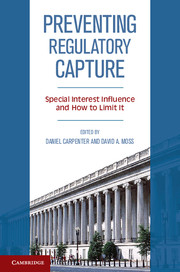Book contents
- Frontmatter
- Contents
- List of Figures
- List of Tables
- Editors
- Contributors
- Preface
- Acknowledgments
- Introduction
- Section I Failures of Capture Scholarship
- 1 A Revisionist History of Regulatory Capture
- 2 The Concept of Regulatory Capture
- 3 Detecting and Measuring Capture
- Section II New Conceptions of Capture – Mechanisms and Outcomes
- Section III Regulatory Case Studies
- Section IV The Possibility of Preventing Capture
- Conclusion
- Afterword
- Index
- References
3 - Detecting and Measuring Capture
Published online by Cambridge University Press: 05 June 2014
- Frontmatter
- Contents
- List of Figures
- List of Tables
- Editors
- Contributors
- Preface
- Acknowledgments
- Introduction
- Section I Failures of Capture Scholarship
- 1 A Revisionist History of Regulatory Capture
- 2 The Concept of Regulatory Capture
- 3 Detecting and Measuring Capture
- Section II New Conceptions of Capture – Mechanisms and Outcomes
- Section III Regulatory Case Studies
- Section IV The Possibility of Preventing Capture
- Conclusion
- Afterword
- Index
- References
Summary
The plausible breadth of capture notwithstanding, scholars examining regulation and regulatory institutions face substantial difficulties demonstrating the existence and degree of capture. Several generations of research have adduced quantitative or historical evidence that agency decisions or legislative outcomes have been partially associated or correlated with the wishes of the regulated industry. However, few of these analyses have been able to demonstrate that the associations/correlations in question represent capture rather than other patterns – representation, differential (and rational) weighting of other features of firms and industries, the possible coincidence of public interest and industry interest in some dimensions of regulatory policy, or something else.
In short, the evidentiary standards of the capture literature are rather low, and the first aim of this essay will be to demonstrate this point and to suggest that more circumspection is in order. A second aim of the essay will be to examine possible inferential strategies, all of them involving observational research using both quantitative and qualitative data, with which qualified claims of capture might be made. A third aim is to encourage scholars to point more concretely to different mechanisms by which capture might operate. I elaborate these aims after a brief conceptual discussion of capture.
- Type
- Chapter
- Information
- Preventing Regulatory CaptureSpecial Interest Influence and How to Limit it, pp. 57 - 68Publisher: Cambridge University PressPrint publication year: 2013
References
- 9
- Cited by



